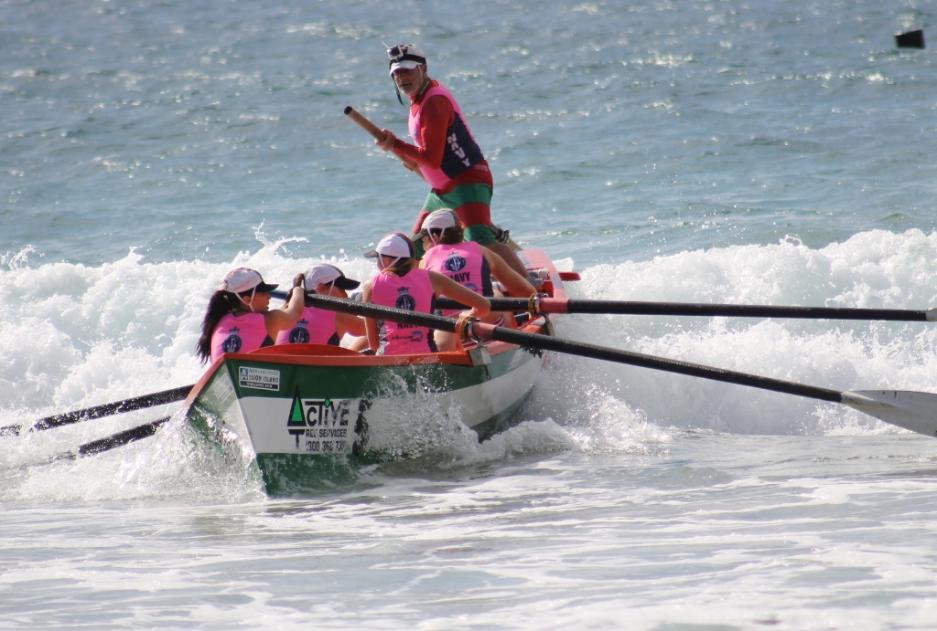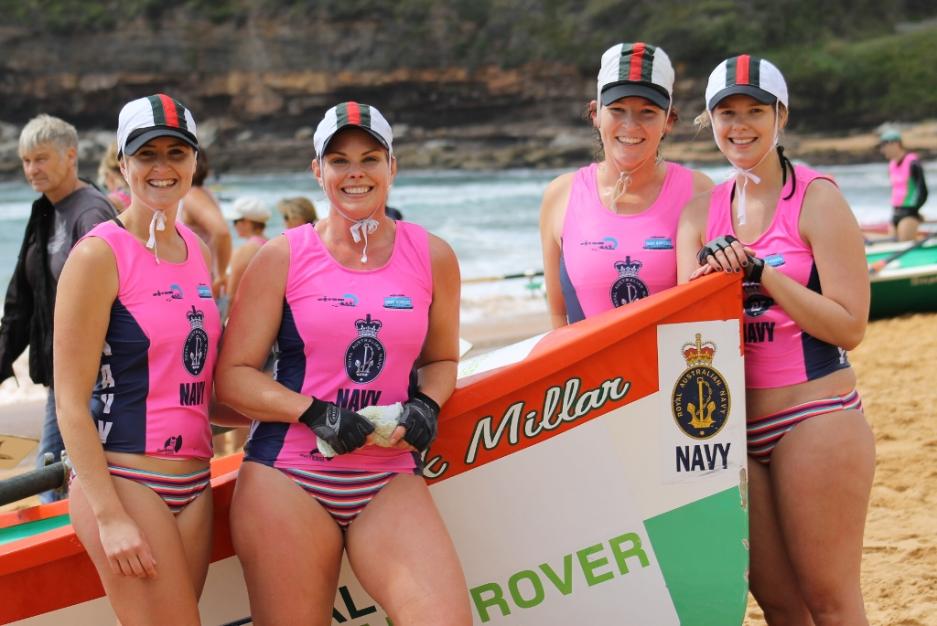May 25 - 31, 2014: Issue 164
Rick Millar
When on the beach last Summer marvelling at the surfboat races for the Sydney Northern Beaches SLS Branch Premiership many on the sand pointed to Mr. Millar and said he has trained over a thousand people and is the best in the business, some even nicknaming him ‘god’ in reference to surfboats, training crews and sweeping.
Although Rick states there’s no way he has trained one thousand, he has been doing it for a long time, decades in fact, and was recognised by Pittwater Council with a Certificate of Appreciation for Services to Surf Life Saving on the Northern Beaches in 2012. Besides phenomenal success in the surfboats arena, (some of Ricks results are listed below) Mr Millar is known for being a straight talker with a strong streak of common sense and ultimately, for having a life long passion for rowing and being out on the water, a commitment to his crews that has not only been a positive in many lives but a life shaping experience that has set flexible steel in their backbones too.
This year he is sweeping the very successful Avalon Beach SLSC 'Antiques' an all women crew, in the Lifesaving World Championship - 2014 Montpellier in France which this Master's crew won in 2012. Rick was also coach and sweep for Avalon Beach SLSC's first women's crew in the 1993/94 season.
“Rick is an amazingly skilled and motivated coach and sweep and surfboat rowing is his passion. We trust him implicitly, whatever the situation, and we’re sure we would not have achieved the results we have if it weren’t for him believing that we could do it,” said the Antiques in a special report on their successes and being named Competitors of the Year in the Avalon Beach SLSC’s 2012/13 Annual Report.
This week a small insight into almost 40 years of a passion for surf boats:
When and where were you born?
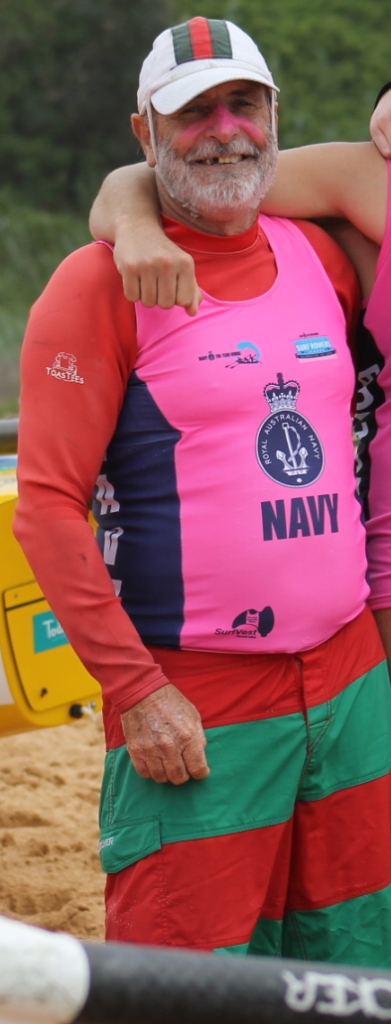 In Sydney, 1948. I lived in Narooma for 12 years, down the South Coast. Our parents decided they wanted us to have an education, so they moved up here (to Avalon) in 1960. I went to Narrabeen Boys High, unfortunately it wasn’t co-ed in those days.
In Sydney, 1948. I lived in Narooma for 12 years, down the South Coast. Our parents decided they wanted us to have an education, so they moved up here (to Avalon) in 1960. I went to Narrabeen Boys High, unfortunately it wasn’t co-ed in those days.
Avalon Beach Surf Life Saving Club – when did you join there?
When I was about 14 (1962); it’s a lifestyle. Back then I was one of the few locals. In those days most of the people in the surf club were from the western suburbs of Sydney, which is why our colours are red, white and green, the colours of South Sydney. I loved it. I used to go down the beach and spend the whole day down there. As a kid there’s nothing better. I loved the beach – also, I could go for a surf and get a hot shower.
Some people join the surf club because they want to row, others want to run. If you ask anyone after ten years why they joined a surf club it’s not the reason they’re still in there.
What’s the reason you’re still in there?
Mainly the boats for me – and I love it. I’m a passionate Avalon Beach surf club supporter. I love Avalon Beach, emphasis on the word ‘beach’; I can recall going to meetings and those running them would ask if anyone from Avalon was there; I’d never answer until they said ‘Avalon Beach’; people don’t ask where ‘Palm’ is; our name is Avalon Beach – it’s not ‘Avalon’; this may be a simple thing for people to use but it’s not our name.
I was made a Life Member in 1989; I’ve filled every position there is, everything you can do in a surf club I’ve done, except President – I never wanted to do that.
What do you think is in you though, that has made you commit to decades of service in the Surf Life Saving movement?
Well, I don’t drink, don’t smoke – I like it, it’s a lifestyle, it’s community based; I can’t really explain why. Even yesterday we had an event with surf boats – our season ends, for surf boats, five weeks ago- and we said, let’s juts get in the surf boats and row from Manly to Watson’s Bay, go to the pub and have something to eat and come back. There were 35 crews there and they all loved it; we had old women, old men, young people as well. That was a cold wet windy day and everyone went. If you had told all those crews they were going to train on that day they would have rung up and said they couldn’t make it…but if they’re going for a row, they’re in; they’re with friends, with people they like.
I really enjoy the coaching because it allows you to see the results – when I was rowing you had to be six foot three, I was five foot eight, little, so I had to really want it, fight for it. If you give me four unfit odd sized people who really want it, I’ll take them more than giving me four athletes, and they will go better.
There was one kid who was about 100 pounds when he first starting rowing with me at age 16; he really wanted to row, said I would laugh at him. I said ‘no; if you can do the run you can row’. It took him about 44 minutes, he came back said ‘I’m out, aren’t I?’; I said ‘no, come back next week and do the run in 42 minutes’; and now, no one can catch him; he is the most loyal, he’s been in three Australian finals. If you give people a reason to believe in themselves, it’s amazing how much they grow; 100% in most cases, especially kids.
Everybody keeps saying that kids nowadays are ratbags; I think the problem is they’re too protected. Give them some responsibility and they grow. I’ve got one kid who I was told to ‘never take this kid, he’s BIG trouble’; so I said ‘I’ll take him’. He was only big trouble because everyone had told him he’s big trouble; he was a spoilt kid, but I just kicked him into shape and he responded to being given an insight into discipline. I even went to his dad and said ‘look, you can smack me in he mouth here but you’re doing the wrong thing by your kid, you don’t spoil him, you reward him once he gets it, once he has earned it.’
I remember one mother came up to me and said ‘my son is not rowing because he won’t study.’ I said, you’re actually doing it the wrong way; let’s get him rowing the boat and then once he starts in at the rowing then you can say ‘if you want to keep rowing you have to study’. She came to me a year later and said ‘you were right.’
So that worked; instead of stopping him doing something she knew he’d love; she wouldn’t let him start in the first place.
When you go into surfboat training, if you’ve had a bad day and rock up for a row, it’s five people who want to do the same thing and have fun. You forget the rest, it’s really immaterial and it works; that really works. One girl came the other day, she’d had a fight with her boyfriend, I said; just put his face on the end of your oar there and smack the sh*t out of him. And you’re with all your friends – what I like teaching the people to learn is that it’s not all about them; if you have a bad day then it’s our day to look after you; the bond you build with each other is hard to explain.
My old A crew which is four kids who went to Barrenjoey; they have such a strong bond. When I first start with a kid’s crew rowing, when they’re 17 or 18 – I’m god…
That’s actually what they call you on the beach Rick ‘god’ – at the boat carnivals…
(laughs); then after 3 or 4 years, as teenagers, they know more then you do – you know how teenagers all know more than you do?
Yes….
So they’re a little bit cheeky; and then after another five years they actually do know more than you do and you’re a compete waste of time; and if you hang on to them for 10 years, it goes back; they realise they don’t everything!
How long have you been in surf boats?
Since I was 15. I think my first boat was the Norman Cook; we were a junior crew then and I think we were one of the first ones to get a medal for the club. I was the junior bow man; I was just a little guy but I wanted to race. I had to be strong to keep up with everyone else; which is why I don’t worry about the size of rowers I get nowadays. I only worry about the size of their heart, not the size of their body.
Rick was also awarded the Norman Cook Memorial Award – Club Member of the Year (2010)
The Stomp Pays for Clubhouse and Surfboats - SEASON 1962-63
Trust me, this is exactly how it eventuated. The name of the regular band was ‘Billy Jay and the Sundowners.' Barry Feehley became their manager. The first custom built surfboat was ‘Margaret', named after Norman H Cook's wife. On the day ‘Margaret' was delivered, the council delivered one of their freebies and we ended up with two brand new boats. The council boat was a much better wave boat and was named Norm Cook. Cookie didn't approve so we renamed it Norman Cook II. John Fuller wanted to wind up the Stomp dance asap because of minor damage occurring to the club but the committee refused as we were making an absolute fortune. I think we shut it down April, possibly May. The club paid for the club (house) outright with heaps left over to purchase ‘Margaret' and then some. Regards, Pogo. - Retrieved from: www.johnfarls.com/MEMOIRS_FROM_ME_MATES.php
Why did you fall in love with the boats – there must have been something to spark it off?
I can only think that when I was younger I was last to be picked to be part of the team. I was always not big enough to be picked but always wanted to be there. With the boats I found a niche there; and then, when you train, you’ve got to run and there I found I could run faster then everybody. When the strength came I wasn’t strong enough but pound for weight ratio I grew stronger, and after that I just really enjoyed the comradeship and when you’re training, you’re out on the water and the four of you, it’s pouring down with rain, everybody is there for a reason and there all they’re for the same reason.
What do you remember about those first boat crews you were part of?
I was never a supreme athlete at school in running or anything – I was always average at everything, but it’s a team sport so I loved that – there’s nothing better then crashing through surf, nothing better than getting out in a 10 foot surf. The members of my first crew were Denis Casali, John Griffin, who unfortunately has passed away. Peter Pearce, myself and sweep Brian Sproule(Spalsha).
Did you travel to competitions?
Yes. Back in those days we always had a trailer. We’d sit in the back of the truck; I can remember when we used to go up Newport hills we’d have to get out and run up the hill because the truck couldn’t do it. Nowadays, with seatbelt laws, you can’t do that. We used to sit in the back of the truck, had mattresses in the back of the truck – it was fantastic fun.
How did you become a sweep?
I kept rowing until I was about 26. Then we had a guy called Lod Legget sweeping; he took over sweeping. Brian Sprouse had left the club and Lod Legget, who was pretty well known, said I’ll fill in with you. He took us over and we rowed ‘A’s and won the State (1974) with him rowing with us. After that he retired and there was no one else so I stepped in. I’d rather row but I stepped in and for me it was natural – I was lucky. I’m a bossy person anyway – it just happened.
At the boat carnivals attended last season many have said we should interview you, that you’ve coached thousands of people…
I don’t know whether it’s thousands, but it’s a fair amount of people.
How many years have you been sweeping?
I started in about 1977 – some years I’ve had six crews, other years only two or three – I’ve lost track of how many but have the records somewhere. So around 37 years all up so far.
There have been some phenomenal boat crews that have come out of Avalon.
There’s been some great ones; the best ones have been those that are locals. I don’t actually get rowers from other clubs – every boat crew I’ve taught has had a local kid in it. My really good A crew all went to Barrenjoey High School.
I remember one year I had six crews, that’s 30 people and all of their phone numbers started with 9918 – I was actually more proud of that, seeing they were all locals. Some of my crews have said to me ‘why don’t you just go and build yourself an A crew?’ – but that’s not coaching.
Coaching is taking on someone who is no good or has no experience and helping them do well. You don’t have to win to be successful actually, you just have to improve. Winning is improving; coming first is successful but winning doesn't mean you have to come first all the time.
What is your training regime?
I’m sweeping six crews so that’s around 22 hours training each week. It’s a lot but I enjoy it. I love the coaching; even though I bag women, they’re strong; they’re self confident and don’t take crap from people. They walk down the beach confident – they’re different.
We’re into the off-season now – what will you be doing?
Well, my Master’s Crew, the Antiques, wants to go to France for the World Titles in September. They won the World Titles here last year; they’re great and lovely too. So they’re going to go to France in September. Someone asked me why I called them ‘the Antiques’ – I answered because they’re old but they’re good. Their average age is 50.
I also have another Open Women’s boat crew and they really want to go a bit better next season so they’re going to start two months earlier than we normally do – I won’t have too much of a break this Winter.
Normally, in the Winter, the Australian Titles end of the first of April, I don’t talk to any of them for four months; I don’t go anywhere near them. They need the break.
This is the same girls who went in the George Bass row – The Antiques – how was that?
They won that. The George Bass is raced over 7 days; it is a tough race physically and mentally
Initially (5 years ago) I didn’t want to do it – they wanted to do it, so I went along. This is the 3rd time they have done it. When we finished that race this year, I wasn’t very popular with all of them. It was one of the toughest, and I really had to push them to the limits I knew that had.
As with all my rowers I told them there’s only one limit that you have in life and that’s the limit you place on yourself. You can do anything – it’s all possible. Everyone can do it – you can do whatever you like.
What’s going to happen in France?
That’s the World Titles- at Montpellier; after that there’s a carnival at Biarritz. The last World Championships were in Adelaide; they won that, that was a fantastic effort. The World Titles in France – we don’t know who’s going to be there yet. They might have to row in the Open Divisions against Open Women. But if they’re rowing against Open Women from other countries they’ll still do well against most of them.
Do you take over your own boat?
No; there’s boats already over there for us; we have to take our own rowlocks; we row with different rowlocks from everyone else; and we’re looking at whether we’ll take our own oars, this could be too expensive and we might have to borrow them over there. If we take our oars and bring them back that will cost us about $2500.00 and a whole set of oars is only about $4000.00, so that’s a Catch 22.
Will you go over and do a few weeks preparation beforehand?
No, these girls are so good they don’t need it. All the work will be done beforehand. This reminds me of a funny story that illustrates that; we went to Perth and watched the Australian Titles; we’d been rowing here the week before when I was talking to you, and everyone else. Then we all hopped on planes and flew to Perth and went back to the beach and we were all back on the beach talking to the same people.
I had one crew for 14 years and for two of those years we nearly used to get into fights all the time – and I mean physical fights, not just words. But; we were all there for the one cause so we lived through that. You talk to those guys now, they think I’m fantastic. And this taught me a lesson too; one year I was fighting with them massively; they’d argue about their training, I didn’t know anything, I was too old, I’d taught them all they could know from me; once you start teaching people you notice that the funny thing about knowledge is that it’s only important when you don’t know it; once you know it it’s easy.
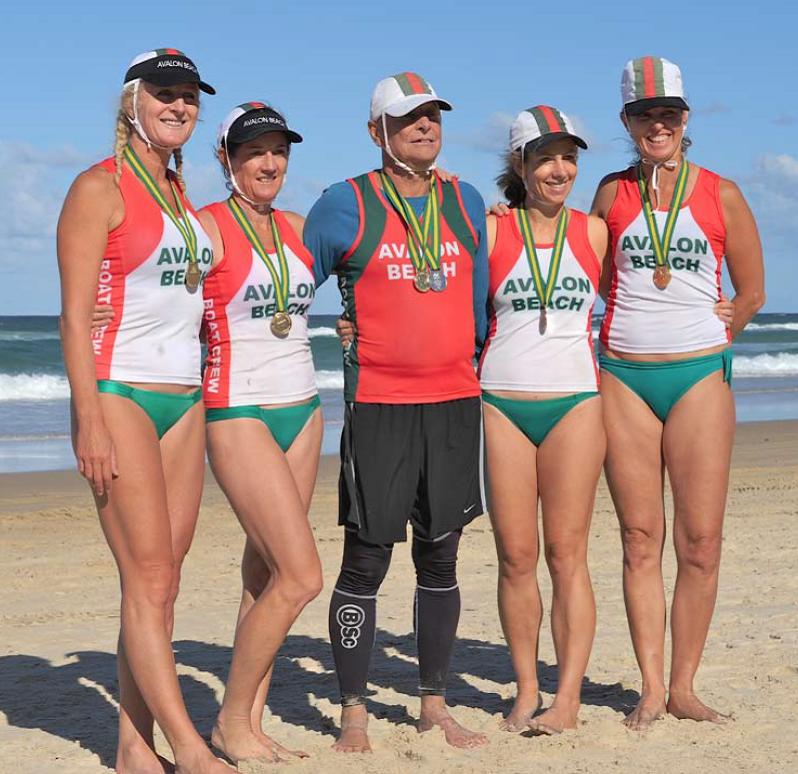
Australian Titles 2011-12 - Kurrawa: Gold - Masters women’s 160 year Donna Wishart, Kerry McEwan, Beverley Tilbury, Tracy McSullea, Rick Millar - picture from Avalon Beach SLSC's 2011/12 Annual Report
We went to a carnival and I was sweeping. Some one had a go at me and the guys went up and said; ‘if you talk to him like that again I’ll smack you in the mouth; we are the only ones who have a right to talk to him like that’. And that was very emotional for me actually; here I was thinking these guys hated me but as it turns out it didn’t matter how they felt about me at any time, they had a right to talk to me like that but no one else had that right. Those kids are now in their 40’s and they’ve got their own kids.
Most rowers who stick it out are in their own businesses; they’re bosses, they’re not workers, they become leaders within themselves. Two years ago they wanted to go to the Australian Titles, for the Masters Division, and these guys were then an average age of 35, and six weeks before the Australian Titles they said ‘we want to go and row in the Masters’. I said, ‘come on guys, you haven’t done any training.’ They said, ‘no, we’ll just go for the fun of it.’
I said, ‘fine; you’ve got six weeks’; so we trained once a week for six weeks for 45 minutes – never in the surf. We get up to the Masters, make the final – the surf came up, the race starts – we got out through the surf, I said ‘who else got out?’ – no one.
Who are these guys – what are their names?
It was Bjorn Wolthers, Shaun Wolthers, Peter Carter and Adam Schofield. They then decided they’d row Reserve Grade as well. They said to their wives – we’ve got Masters on on the Tuesday and the main carnival for all the young people starts on the Thursday; we’re here, we may as well row Reserve grade for a bit of fun. So they rang their wives said ‘we’re going to row Reserve Grade – we’ll be home Thursday night.’
Came last in their first race; went to what is called a repechage, which means they go back- they won their repechage and at any rate, Thursday night, ring their wives ‘sorry, we actually got through – so we’re going to race Saturday and we’ll come home Saturday night.’
Saturday night they cut the Reserve Grade down, and these are crews that have rowed all year, trained all year; they cut them down to the final 12. Saturday, back on the phone again; ‘sorry, we made the final 12.’
They actually made the final 8 and missed making the final, with no training, by one length in the boat race. If they’d trained they may have gone better – but they’ve been together for so long they just work well together. The trouble was I tell all my young boat crews the harder you train the better you will go and they say ‘these guys didn’t train at all, look how well they went’.
But they’ve been a crew for years – they’d be a well oiled machine?
Exactly. When we got out into the surf there was a big sea running. My guys know how to be in these seas. They know what to do – I don’t have to push my guys when we’re out there – they know what to do. My crews are taught – yeah, you’re going to get pounded in the surf but if we see the break, our boat is always closer to the white-water so that when that break comes, we’re gone. The others will still be a long way back – by the time they get up to where we were, another wave has formed and they get turned over.
The Avalon Beach SLSC crews were outstanding over in Perth this year – the Antiques girls won!
That is 4 Australian titles in a row for them. I’ve told them to have a break from it for a few weeks, build themselves up again, and get fat. It’s not a continuous grind but they’ve been competing constantly for a few months now; so I let them go away for a few months and drink and eat and do whatever they want and let them realise they’re missing the rowing and that there is nothing else – they’d rather be out on the water, they realise how good it is.
When you’re passionate about something that’s it (it’s your life).
So how do skills and experience work in your favour if there is a dangerous sea running?
I don’t know – I think it becomes like second nature. Before a race starts I’m nervous but once the guns sounds I’m fine. I was just lucky – it’s what I’m good at. The young sweeps coming through now are not getting enough experience in challenging seas – even in four foot surfs they are not allowed out – how are they going to learn if they can’t? The best place they can go out in a four foot swell is at a carnival when the rest of us are there to watch, to help them. When they’re told they can’t go out at carnivals they end up going out at Palm Beach when there’s a six foot swell running, to learn, and go by themselves, and there’s no one there to help them.
I learnt most of my sweeping when you couldn’t pull out because everyone’s watching you and you learn that way. In big seas you don’t race – in big seas you just get in and out again, and if you do that, you win. Being consistent – basically. I think I’ve gotten close to cracking the biggest wave a surf boat has ever cracked but it’s being consistent that counts.
The future of surfboats – what do you hope for there?
I’d like to see it keep on going. I hope they keep allowing us to row in the surf – if we’re restricted to flat water it will become really boring. Surfboats are an iconic part of lifesaving – they go back to the original lifeboats and all they were used for. There’s nothing more spectacular then a surfboat carnival is there’s a sea running – I hope people return to coming to the carnivals and those that already do keep enjoying them. Our sport is such a fantastic sport – I really hope it continues
I was president (2002-2005) of the ASRL (Australian Surf Rowers League) for four years when that first started. We set that up as when we would attend a carnival after training really hard all week, some guy who was an official, who has never trained at rowing in his life, would say ‘if you don’t do what I say you’re off the beach’.
Every surf club has a leader in charge of surf boats; once I got those together we formed the ASRL – we reasoned we’d be hated for three years but after that would get some clarity and after that we’ll be right – which we were.
www.asrl.com.au/about/asrl-intro-a-history
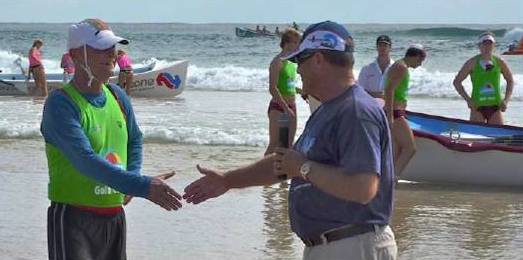
Rick Millar is presented with Life Membership of the ASRL at the Australian Titles at Kirra Beach
Everyone thinks surf boats are dangerous – they’re not dangerous – I’ve only had three accidents throughout my decades. It’s just the perception that they are.
I can remember one training session I had with my young kids – we were out in big seas for two hours and it was hard but they trained well. We came in and as we put the boat on the beach a young kid got dragged out in the rip; this was in ten foot seas. Two of my guys jumped in the water and rescued him. Surf boat rowers are tough; they’re so fit. People don’t realise how strong they are, even the girls.
What to you is the essence of the surf boat culture?
To me it’s just you against Nature, and being able to control it.
You have travelled too – where have you travelled to?
We won a trip to America to represent Australia by winning the Australian Titles. We got represent Australia over in America. We went to South Africa to row in the World Titles – we raised the money and went across for that. I’ve been to other places with my kids; they’re very good squash players, so we’ve been overseas with them. My daughter has represented Australia playing squash.
So you have a very fit family?
Basic fitness, yes. For my age I’m pretty fit – but I measure myself up against my rowers and I’m actually a fat old bastard compared to them. I mix with 20 year olds and until I look in a mirror I still think I’m 20. then when I go to lift the boat or do something equally strenuous I notice ‘the old boy is not quite as strong as he used to be’. Before I married is used to do touch football, squash – all sorts of sports. I love to row – rowing is a great sport; most of my crews don’t understand that I’d rather row than sweep – any day.
So if you could be an animal you’d be a dolphin or something aquatic?
I don’t know what I’d be – probably a ratbag! There would be a creature that you could call a ratbag if I was there.
Everything that can be done in our sport I’ve been lucky enough to do. When Lod Leager was sweeping for the State Titles he was 64. My aim back then was still to be sweeping when I’m 64, well I’ve passed that and I don’t see myself stopping yet.
What’s the best beach to take a boat out in?
Avalon Beach. It’s the most deep. You control the surf at Avalon Beach you can surf at any beach. It’s about if there’s a ten foot surf there – can you get out? If it’s dumpy, choppy – one of my girls came straight to me from a rowing club. Her first year she said to me ‘are those waves dangerous? Or ‘what sort of wave is that?’
You teach them about the waves; you hear on the news about how dangerous rips are – from my perspective rips aren’t dangerous; lack of knowledge about them is dangerous; but rips can be used to your advantage.
I remember when my daughter was in Nippers I used to take her in the Open Surf Race – people couldn’t understand why I did this – but she’d run down the beach and go out in the rip. She used to beat all of them. Rips can be useful and if you don’t panic you can’t get hurt.
What is you favourite surfboat?
The Clymers; they’re all the same. If you remember the 18foot sailing boats, they were all the same, there were millions of them. Surfboats all have a set criteria otherwise it would become so expensive that the richest crew would win. So the boats all have a set criteria and definition and they can be altered. That way, at the end of the day, it comes back to skill, which is what it should always be about.
What is your favourite place in Pittwater and why?
Avalon Beach – the whole of it. I live in Riveria, my parents live in Palmgrove, my sister is in Alexandria, my brother used to live in Bilgola. Avalon Beach is starting to become like it used to be. When I first came here it was a great community; you’d walk down the street and you knew everybody. It’s actually starting to become like that again now, which is great. I just think that it’s a great community and that we’re very lucky here.
What is your ‘motto for life’ or a favourite phrase you try to live by?
The only thing that places any limits on what you do in life is yourself.
That’s the first thing I tell all my crews when they begin training. I hate the word ‘can’t’ because anyone can do anything they like. The other phrase I hate is when people say they’ve made sacrifices to do this; I’ve never made a sacrifice, I’ve made a choice.
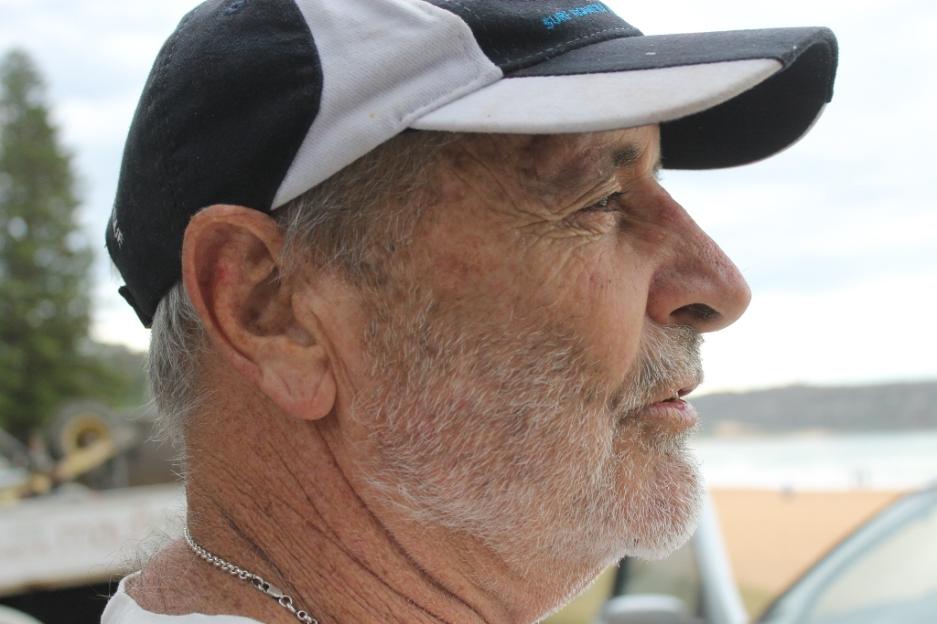
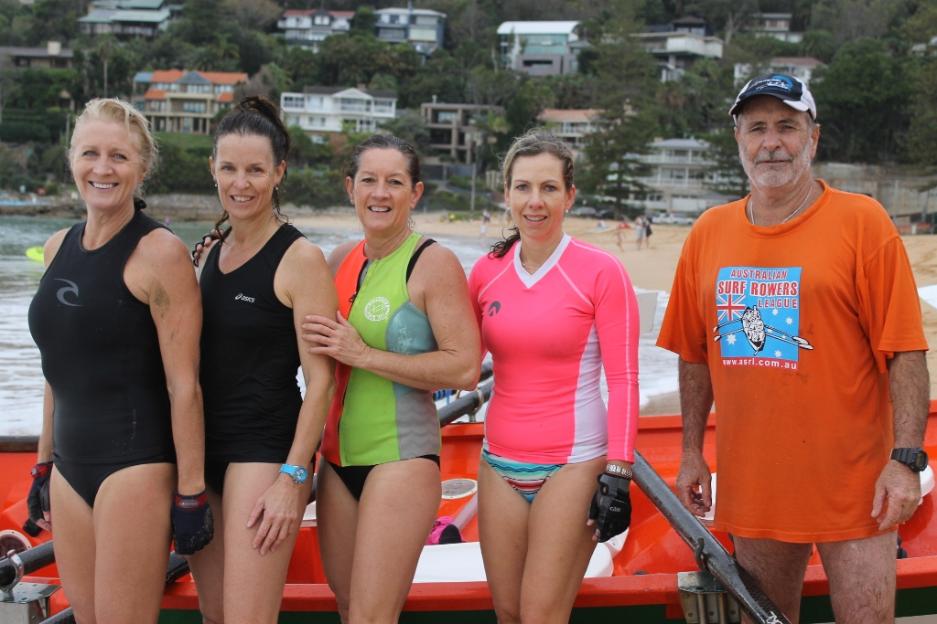
The Antiques - Avalon Beach SLSC Women's Masters Boat Crew: (Left to right) Tracey McSullea, Kerry McEwan, Bev Tilbury, Donna Wishart, Rick Millar (sweep)
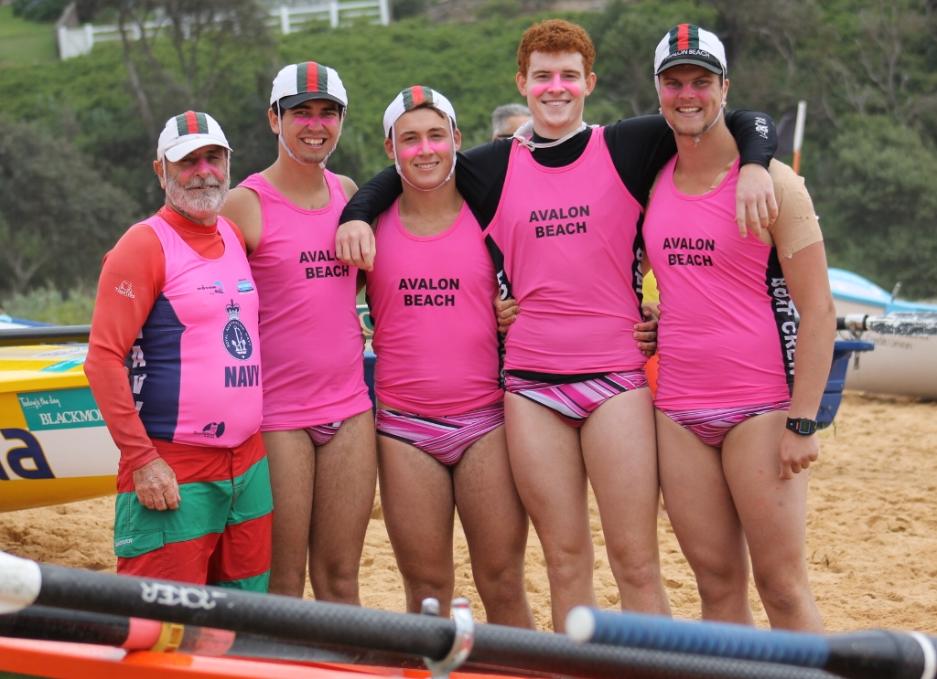
Rick with 'The Pink Bits' - Warriewood Surf Boat - 2013
Rick Millar - Some of his Successes
Avalon Beach SLSC’s first National Champions and first National Surfboat Champions - Rick Millar, Darryl Johnson, Michael Heathcote, Brent Walker, Nathan Press, 1993, Kurrawa.
Avalon Beach SLSC’s first Australian Surf Rowers’ League Hall of Fame - Rick Millar
Avalon Beach SLSC’s first female surf boat crew - Karen Fisher, Rachel Pike, Samantha Law/Melinda Akehurst, Michelle Hall, Rick Millar, 1993-94.
George Bass Marathon 2010 – Rick Millar, Robyn Jennings, Beverly Tilbury, Tracey McSullea and Donna Wishart.
Hall of Fame - Australian Champions
1989 Silver - Boat Crew - Michael Heathcote, Mark Wood, Brent Walker, Daryl Johnson, Rick Millar
1993 Gold - Open Boat Men’s Crew - Rick Millar, Nathan Press, Brent Walker, Daryl Johnson, Michael Heathcote
Bronze - Masters Boat Crew - Robert Fulton, Kim Marsh, Steve Reilly, Geoff Russell, Rick Millar
1995 Bronze - Junior Boat Crew - Ian Dagleish, Michael Taranto, James Davison, Angus Wilson, Rick Millar
1996 Silver - Reserve Boat Crew - Bjorn Wolthers, Pete Carter, Shaun Wolthers, Matt Hulme, Rick Millar
2000 Bronze - A Colts Boat Crew -Rick Millar, Chris Davison, Jon Hulme, Mike Luke, Nathan Wellings
2003 Silver - Reserve Boat Crew - Chris Davison, Michael Luke, Nathan Wellings, David Lee, Rick Millar
2011 Gold - Masters Women Boat Crew 180 years Donna Wishart, Robyn Jennings, Beverley Tilbury, Tracey McSullea, Rick Millar
Gold - Men’s Masters 140 years - Peter Carter, Adam Schofield, Nathan Wellings, Bjorn Wolthers, Rick Millar
2012 Gold - Masters Women 180 years Donna Wishart, Kerry McEwan, Beverley Tilbury, Tracey McSullea, Rick Millar
Silver - Masters Mens Boat Crew - 140 years - Peter Carter, Adam Schofield, Nathan Wellings, Bjorn Wolthers, Rick Millar
2013 Gold - Masters Women Crew - 180 years - Donna Wishart, Kerry McEwan, Beverley Tilbury, Tracey McSullea, Rick Millar
Gold - Masters Mens’ Boat Crew - Peter Carter, Bjorn Wolthers, Shaun Wolthers, Adam Schofield, Rick Millar
COMPETITORS OF THE YEAR
2013 Kerry McEwan, Tracey McSullea, Bev Tilbury, Donna Wishart, Rick Millar
2012 Rick Millar
WORLD TITLES - CHRISTIES BEACH/ GLENELG,SOUTH AUSTRALIA - 2012
GOLD- Women’s Masters Boat Crew – Bev Tilbury, Kerry McEwan, Tracey McSullea, Donna Wishart, Rick Millar (sweep)
AUSTRALIAN TITLES - KIRRA, QUEENSLAND
GOLD - Masters women’s crew 160 yrs – Bev Tilbury, Kerry McEwan, Tracey McSullea, Donna Wishart, Rick Millar (sweep)
GOLD - Masters men’s crew.140 yrs – Shaun Wolthers, Bjorn Wolthers, Peter Carter, Adam Schofield, Rick Millar (sweep)
NSW TITLES – UMINA
SILVER- Women’s Masters Boat Crew – Bev Tilbury, Kerry McEwan, Tracey McSullea, Donna Wishart, Rick Millar (sweep)
ASRL
GOLD - Women’s Masters Boat Crew – Bev Tilbury, Kerry McEwan, Tracey McSullea, Donna Wishart, Rick Millar
SURF LIFE SAVING SYDNEY NORTHERN BEACHES CHAMPIONSHIPS
BRONZE - Under 19 Men’s crew – Tom Curnow, Tom Warburton, Nick Sampson, Matt Mayall, Rick Millar
BOAT PREMIERSHIP
GOLD - Under 19 Men’s crew - Tom Curnow, Tom Warburton, Nick Sampson, Matt Mayall, Sweep Rick Millar – ‘The Pink Bits’
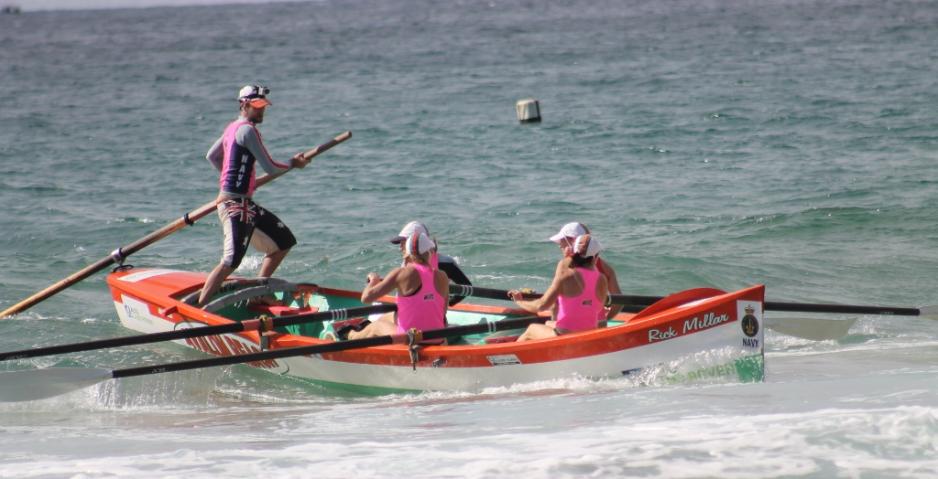
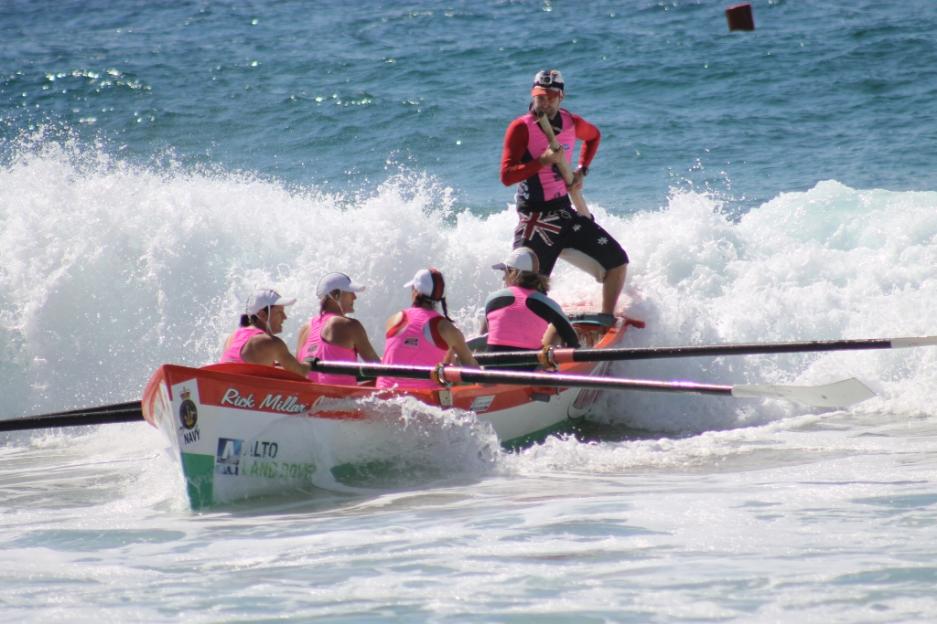
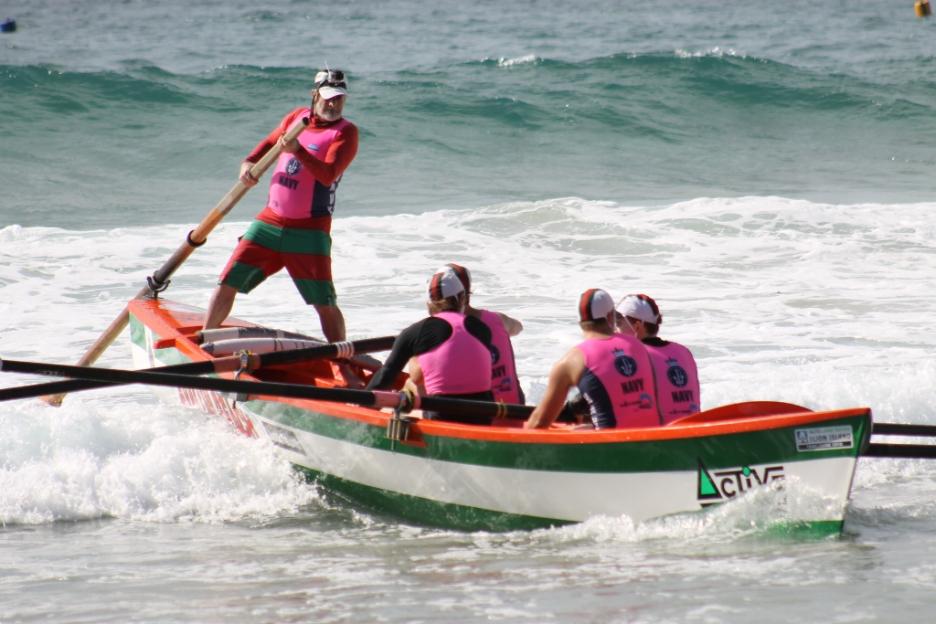
Rick sweeping the boys crew, and below, the girls - Bilgola Surf Boat Carnival, 2013.
